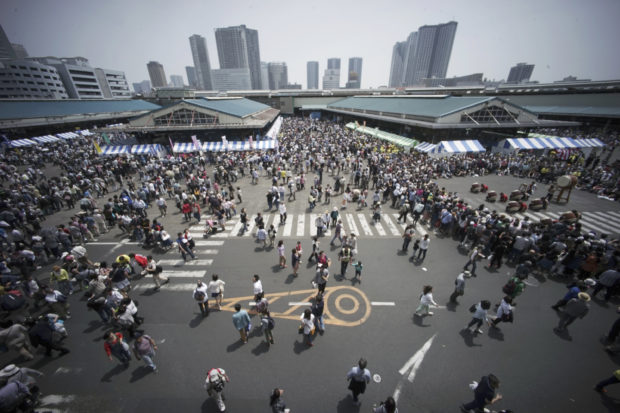
In this May 3, 2016, file photo, people visit a festival held at Tsukiji fish market in Tokyo. Tokyo Gov. Yuriko Koike said Tuesday, June 20, 2017, the giant Tsukiji fish market, popular with tourists, will stay, although it will get modernized and developed within five years. Koike said that the market will temporarily move to Toyosu, which required a 600 billion yen ($6 billion) investment. She canceled the move in August, just months before Toyosu’s scheduled opening, after food safety concerns were raised. (AP Photo/Eugene Hoshiko, File)
TOKYO—Tokyo’s huge, and largely popular, Tsukiji fish market won’t be destroyed but will be closed for up to five years while it is modernized and turned into a “food theme park,” the capital’s governor said Tuesday.
The market will move to a state-of-the-art 600 billion yen ($6 billion) facility in Toyosu on the eastern outskirts of Tokyo while Tsukiji is rebuilt. After that, Tokyo will have two wholesale fish markets, Gov. Yuriko Koike said.
Koike had halted the planned move to Toyosu last August, just months before the new market’s scheduled opening, after food safety concerns were raised. Toxins have been found in soil and groundwater at Toyosu, which was previously the site of a gas plant.
The initial plan was to sell the bayside Tsukiji property after the move, possibly for a shopping mall or casino.
But Koike said she is opposed to such a one-time cash gain for the capital. Tsukiji is a valuable brand and landmark, she said at a news conference.
“Our country has always valued tradition,” she said.
Koike declined to give an exact timeline, stressing she was just announcing a basic plan that still requires approval by the city legislature.
Toyosu will also need to be cleaned to ensure its water systems and soil meet safety standards. The city faces a challenge in calming public fears about the toxins at Toyosu, which have drawn widespread media coverage.
The massive new complex, loaded with huge refrigeration units, will be expensive just to maintain.
Meanwhile, Tsukiji, famous the world over for its tuna auctions and quaint sushi joints, has hobbled along and is still busy with tourists.
Koike said she wants to turn Tsukiji into a “food theme park,” rebuilding its antiquated buildings and adding the latest earthquake-resistant technology. Japan is among the most quake-prone nations in the world.
She believes Toyosu’s high-tech distribution systems and its proximity to airports will help make it a bustling market that can co-exist with Tsukiji.
However, some were skeptical.
Hiroyuki Doko, proprietor of Doko Shoten, a wholesale seafood store in Tsukiji, questioned whether businesses will be able to make the same profit in Koike’s theme-park plan.
But Yu Takahashi, manager of a sushi restaurant in Tsukiji, said he welcomes the decision to keep Tsukiji.
“This is where all the fish from Japan, the best fish, come together in one place. The decision will be a good thing for Japan and Tokyo,” he said. JPV